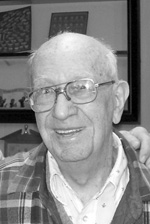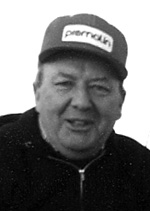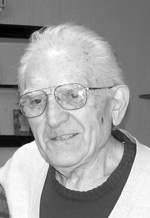Fordyce Post’s Strong Home Town
Winter 2009
There are over 3,100 counties in the Untied States. A study about them, done in the mid-1990s titled “Strong Home Towns,” was published in American Demographics magazine. The study defined a strong community as one in which the people are long-time residents, are civically engaged, have deep family roots and ties, have business interests, maintain ties to multiple organizations like fraternal orders, clubs, religious institutions, PTA, sports leagues, and so forth. You know strong home towns when you are lucky enough to live in one.
 Fordyce Post is legally blind. His macular degeneration does not stop him from taking a daily stroll into the hamlet of Highland to Rizzi’s Jewelers. There, his long-time friend, Vince Rizzi, reads the daily newspapers to him. They discuss the implications of the news, and history—recent, “a while back,” and “way back.” Fordyce, AKA “Fordy” is 96 year old.
Fordyce Post is legally blind. His macular degeneration does not stop him from taking a daily stroll into the hamlet of Highland to Rizzi’s Jewelers. There, his long-time friend, Vince Rizzi, reads the daily newspapers to him. They discuss the implications of the news, and history—recent, “a while back,” and “way back.” Fordyce, AKA “Fordy” is 96 year old.
Visiting Rizzi’s Vineyard Avenue shop, you know intuitively what theStrong Home Town article was about. And, if you visit any of the small towns in Ulster County and spend the day at each town’s unique community “center”— bake shop, barbershop, coffee shop, restaurant, church thrift store, town hall, gym, bar,— you would know that Ulster County had to have done well in that Strong Home Town study of “civic glue.”
Indeed it did. Ulster County is number three.
By the time many of you read this, Fordyce, aka Fordy, may have already turned 97. When Fordy talks about history, it is from the vast memory-reservoir of his life in the Hudson Valley. As for Vince Rizzi, he has watched the world evolve through the plate glass window of his store where he set up shop in 1950s selling and repairing jewelry and watches.
Before I met Fordy, I Met Bob Post
 Just to carry that small town thing a bit further…I met Bob Post and his wife Doris at a the Lloyd Historical Society many years ago. It turned out that Bob had known my father and had worked with him. Over the years I saw Bob and Doris at different events and always looked forward to our next encounter. Bob died two years ago, but not before showing me the albums recording his WWII service in the Pacific. I asked if I could interview him for the historical society archives and for an About Town article, but he modestly would not hear of it. I think he was pleased I asked. At the time he was quite ill and I did not see him again.
Just to carry that small town thing a bit further…I met Bob Post and his wife Doris at a the Lloyd Historical Society many years ago. It turned out that Bob had known my father and had worked with him. Over the years I saw Bob and Doris at different events and always looked forward to our next encounter. Bob died two years ago, but not before showing me the albums recording his WWII service in the Pacific. I asked if I could interview him for the historical society archives and for an About Town article, but he modestly would not hear of it. I think he was pleased I asked. At the time he was quite ill and I did not see him again.
 It was about a year later I went into Mr. Rizzi’s jewelry store in Highland for a new watch battery. Mr. Rizzi introduced me to Mr. Fordyce Post. Lo and behold! Bob’s older brother—who knew? Mr. Rizzi suggested I interview Fordy, as he was at the time over 94 and a long-time resident of the Highland.
It was about a year later I went into Mr. Rizzi’s jewelry store in Highland for a new watch battery. Mr. Rizzi introduced me to Mr. Fordyce Post. Lo and behold! Bob’s older brother—who knew? Mr. Rizzi suggested I interview Fordy, as he was at the time over 94 and a long-time resident of the Highland.
Both Posts were modest and charming gentlemen. Fordy said “yes,” he would let me tape an interview.
He told me about Vince (Rizzi) reading the daily newspapers to him and added, “Sometimes, Vince even reads About Townarticles to me.” I don’t know how long this reading service has been taking place, but it is one of those small town things that make me know I can never leave. I asked Mr. Rizzi if I could interview him, too, but he said it should be Fordy this time. (Stay tuned for Mr. Rizzi!)
While we were doing the interview at the jewelry store, another old friend and life-long area resident, Al Trapani, came in to chat. Fordy said to him firmly, “Excuse me, but we are doing an interview here.” I felt like Woodward or Bernstein. (Mr. Trapani recently passed away and will be missed).
What follows are some of the things Fordy reminisced about.
Fordyce Post: 5-20-08
Rizzi & Son’s Jewelers
Vineyard Avenue, Highland
(Francis) Fordyce Post was born on January 30, 1913 at Hollehans Hill, Town of Kingston. He then lived in NYC for three years and saw the 5th Avenue parade of the WWI soldiers (“boys”) in 1918. Another NYC memory: Taking his sister, two years younger, to Central park and losing her. The Garian Society found her and took care of her. Their father had to come to the jail to pick her up. Fordy said, they traveled all over New York City at a very young age. “Kids grew up fast down there.”
The Posts moved to Highland in 1924 and went to school where the Lloyd water plant is now (down by Mariner’s Restaurant). Two grades to a teacher, two teachers. Mrs. Freer was Fordy’s teacher for grades three and four. Fifth grade, he went to the 1903 school which was in front of the current Middle School on Main Street. At the 1903 school, each grade was in a separate room. Two sixth grades. Fordy finished seventh grade there.
“You see things were a little different then. There was a depression on. I quit school to help the family,” he reported. To help the family, he worked at the Highland knitting mill. The sewer plant is located there now, but then it was huge knitting mill. Fordy made sure the heat was turned on. “I was only around 15 years old,” he said.
Although it was on the Twaalfskill Creek, the knitting mill factory was electric, not water power. The factory, owned by brothers Clarence and Irving Rathgeb, made sweaters. Later the factory moved up to Highland, on Milton Avenue. That site was later Smith’s Hall, then, Grand Union, and later a lumber yard and nursery.
The Depression: While working in the knitting mill, in 1929, Fordy’s three-year old brother Richard died. “Died of dysentery. Bloody dysentery” according to Fordy. It was very tough on the Post family which consisted of six boys and five girls. Fordy’s father cut ice and later worked for the West Shore Rail Road.
After working at the knitting mills, Fordy, joined the Civilian Conservation Corp and was sent to Rigeton, Mississippi. Company #1255. He was supposed to build roads, but did a lot of wildfire fighting. He spent six months in the CCCs and earned $30 a month. Most of the money was sent home to families. “It was a good experience, educational, almost like the Army. We had a captain, sergeant, mess sergeant. Others things went on. Drinking. I quit drinking 50 years ago. It’s the Irish thing,” Fordy continued.
After returning home to Highland, Fordy worked on building the Mid Hudson Bridge. He did iron work and recalls Pete Thompson was the boss for whom he worked.
“After the bridge job ended, I worked on West Shore New York Central Rail Road where my boss, Frank Daywall, was a section boss. Our job was fixing and laying track and ties, and straightening track.” Then, Fordy worked for Thomas Phillips, “rock boss” and father of former Lloyd Town Historian Dotty Phillips Gruner. The Rock gang took care of rock slides along the tracks. Fordy’s father worked in both“gangs”with him.
Fordy also made money when he and his brother-in-law, Joseph Gruner, shad fished from April 15 to early June. They had a boat with a motor, and would cast their nets at White Rock, north of Crumb Elbow (Father Divine’s). They would drift down to the Mid Hudson Bridge, catching 100-150 shad at a time, “running great back then. The shad were being eaten by striped bass.” Fordy’s record for a striper was 20 pounds (caught in a shad net). He could eat it, but could not legally sell it. The record striper he heard about was 55 pounds, he recalled. The shad they caught “were sold to the Jewish people from NYC,” sometime the little fish were shipped by train to the Fulton Fish Market packed in ice. Fishing paid well. “Their roe was good, but shad were too bony.” They also caught small sturgeon in their nets, Bullnose and Pelicans. His brother-in-law, Perry Relyea, caught a 150 pound Bullnose. “Cow Sturgeon were the ones that had the caviar eggs. Supposed to be very delicate, but I never had any,” Fordy said.
Next, Fordy worked at Shatz Federal Bearing in Poughkeepsie on Fairview Avenue. His job was “OD -outside diameter grinding of the ball bearings.” He worked there for 36 years, from 1940—retiring in 1976. He has been retired for for 33 years.
Fordy married in 1936. His wife, Virginia, did not want to get married until she was at least 20 years old. However, just shy of that, at 19, she agreed to marry Fordy, who was 24. They were married in the Episcopal Church on Grand Street, Highland. On marriage to Virginia, Fordy said, “Getting married was the only argument I ever won.”
There was a greenhouse near that church on Grove Street, and Fordy used to cut cord wood for them to keep the greenhouse warm in the winter to grow flowers. A second greenhouse was on the next street, Washington Avenue, run by the Donovan’s.
Fordy and Virginia got an apartment up where the Highland middle school is now, but it had cockroaches, so they moved to a Washington Avenue apartment (across the street from where his brother Bob lived). Then Fordy and Virginia lived in an apartment owned by Joe Gruner on White Street, and finally bought the Fair Street home he continues to live in. Bea Wadlin (my late mother-in-law) lent him the money for his mortgage for the Fair Street house, he tells me.
The Posts had two children. Gary Francis Post was born on April 13, 1938, but he died at age 15 months, possibly of Cerebral Palsy. In July 1948, they had a second son, Richard. Richard died of colon cancer at 59.
I asked what things over your lifetime have you found amazing?
“When the ice broke up in the river (Hudson) and piled up higher than that bank building across the street (30 feet). Now the river never freezes.”
Fordy fell in that river in winter. The night boats would break up the ice when they came in to dock. Fordy went out to get water for someone’s radiator and he slipped right off the dock into the river. “There had been a ladder, but when I got to where it had been, someone had removed it.” He worked pushing the ice away and got to a broken spline and pulled himself up. “No one heard my call for help. I pulled myself out and drove home. My clothes were frozen. Virginia wasn’t expecting me, and she wouldn’t open the door at first. She did let me in, put me in a tub of warm water and mustard, and I never even caught a cold.”
Fordy worked at Clay’s Gas and Oil Terminal (1937) where trucks loaded up with gas, oil, or kerosene. The most upsetting, thing that happened “…a 26 foot Chriscraft (boat) came in to the terminal and was parked there. It blew up.” Fordy was by the dock when it exploded. The boat’s owner had been in the Hotel bar (now an apartment house) drinking. He came out, got on board his boat, stepped on the starter and the sparks ignited fuel fumes. “Scared to death. I was young then, 24 or 25 years old. When the boat blew up, others ran. The boat parts are still there somewhere. Fred Bragg, the policeman at the ferry slip (Ben Bragg’s father) and I pulled the boat people out of the river. “No one was killed, just a few minor burns. Dr. Meekins came down to check everyone out.”
“We saw the Roosevelts when they came through Highland on the train. FBI all over the place.” Fordy also recalls Harry Manville, of the Independent Party, and his “Townsend Plan.” “During the heavy part of the depression Manville wanted to give every retired person $100 a month, that is where the idea for Social Security came from.”
Celebrations in town…what things did you enjoy about them?
Church suppers, Round Up Days- a western theme, “I had a big hat. Bill Judge and I used to pal around together, we bought big black hats. If you were caught not wearing something western you were put in jail. All part of the celebration.” Many men grew beards for Round Up Days. Fordy grew a mustache once, at CCC camp, “It looked like a misplaced eyebrow,” he said.
“Apple Blossom Festival was put on by the Episcopal Church. There was a party at Hotel DiPrima (now The Would Restaurant on North Road). There was an Apple Blossom Queen.” Peter Roumelis and Nick Marone worked on that. Fordy recalled, “Jean Seaman, who married Pete Roumelis, was very pretty.”
Fordy was with the Highland fire department for seven years. “The Main Street fire is memorable, I had to hold the hose, it was so cold the water froze, and the pressure of the water coming from the hose would push you back on the frozen ground.”
Another he recalled, was the train accident that burned three houses. The burning oil got into the creek and the firemen had to keep the hoses on it to keep it from spreading to other houses downstream. Practice army shells were on one car, oil on another. “We had quite a time with that fire.” There were also boxcars of women’s shoes. “People took them when the RR inspectors looked the other way. They took shells, too. There‘s one of those shells in the firehouse now,” he said.
Fordy said he was a Democrat, but he changed to Republican.
What made you really happy?
“I got married… 70 years, my wife and I were happy. At least the last 50 years! We worked together. I miss everybody.”
Ever think of moving to Florida (where his son had lived)?
“No,” emphatically, “Hurricanes.”
“Things are changed so, the stream right out here, the Twaalfskill, I used to catch trout, all kinds of fish, spear suckers, black bass, now nothing, not even eels. Maybe the salt on the roads goes into the water.”
“In the river we used to catch carp, German, Canadian… lot of people used them for fertilizer in their gardens.”
“Remember the old mill pond? Bellevue Road, there was a mill there, Joe Shantz’ grinding mill. Bought eggs from him, too. Daughter was Maddie. Very nice person.”
“They used water power, and had big grinding stones. Quite a few mills around here—Weeds Mill, Phil Shantz. Big farms too, Thatchers, Grace Roberts, Ollie Fischers on North Ohioville Road, the Deyo Dairy Farm. Gone, all gone.”
And your health?
“I’ve been in the hospital a few times, but basically, I’m healthy. I drank and smoked, stopped both.”
Advice at 96?
“Stay away from booze and cigarettes. No booze, no cigarettes.”
If you want to send Fordy a birthday card for his 97th— Jan 30th—you can send it to me at 38 Bellevue Road, Highland, NY 12528, and I be sure Fordy gets it. I’m sure Vince Rizzi will read every word to him!
And, if you or someone you know would like to be interviewed for the Klyne Esopus Museum archives, or the Town of Lloyd Historical Preservation Society archives, or for an About Town article, please email vwadlin@aol.com or call me 845-691-2089.
